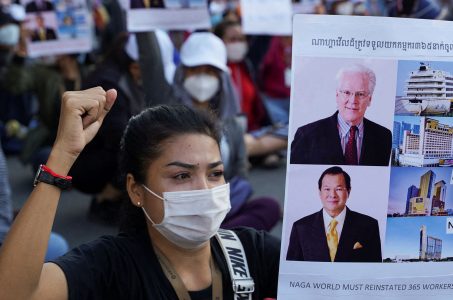Indonesian Christian Gamblers Caned 40 Times Under Sharia Law
Posted on: February 8, 2021, 06:43h.
Last updated on: February 8, 2021, 07:11h.
Two alleged gamblers were each given 40 lashes on the back with a cane Monday in Indonesia’s Aceh province, according to Agence France-Presse (AFP). The pair were also accused of drinking alcohol.

The sentence was imposed in public by a masked Sharia police officer before a crowd of onlookers. The two men chose caning for the punishment over spending about six months in prison. No description of the type of gambling was provided.
“The Sharia police gave us options and we consciously decided to comply with the Islamic criminal code. No one forced me to choose it,” one of the men who was caned told AFP.
A few other people in Indonesia were caned for other charges on Monday. Monday’s canings also come less than two weeks after two Indonesian men were caned close to 80 times for banned sexual practices, the AFP reported.
Rare for Christians To Be Caned in Indonesia
When asked about Monday’s caning, Mark Cammack, a professor at Southwestern Law School in Los Angeles, said it is “rare” for Christians in the nation to be caned. Typically, the punishment is given to offending Muslims.
“It’s definitely painful,” Cammack told Casino.org. “But it’s not like it is horsewhipping.”
Gambling is one of the more frequent crimes that can result in caning in Indonesia, Cammack explained.
Other crimes subject to caning involve alcohol or sex violations.
Caning Allowed Only in Aceh Province
Also, UCLA history professor Geoffrey Robinson said public caning happens only in Aceh, not in any other province of Indonesia.
“Even in Aceh, it is not all that common. But every instance of it stirs a lot of controversy, inside Indonesia and abroad,” Robinson told Casino.org. “I suspect the practice will continue until there is a substantial demand for its cessation from civil society in Aceh itself.”
Human rights groups inside and outside Indonesia have called for an end to the punishment, adds Robinson, who was a former political affairs officer for the United Nations (UN) in East Timor.
Mark Cammack also closely follows Indonesia’s human rights and legal system. He was a monitor for the UN during trials of officials charged with crimes committed in East Timor. He also has been an expert witness on Indonesian law.
From what he has monitored, there are limits in Aceh with such punishments, Cammack said. For instance, the person is not wounded, he is clothed, the size of the cane is restricted, nor can the police officer raise the cane above his head when he is preparing to strike the defendant.
A doctor is available to treat the caned person. Also, if the person asks that the caning be stopped, the officer will stop, Cammack said.
The severity of the caning is less in Indonesia than in other nations where it is permitted, such as Malaysia, Cammack adds. Also, non-Muslims can opt for either caning or imprisonment.
In general, Muslim countries have a prohibition on any type of gambling. It is forbidden in the Koran. More than 90 percent of Indonesia’s 255 million population are believed to be Muslim, the Daily Mail said.
During October 2019, two other men were caned for gambling in Indonesia. A crowd showed up for that caning, too. Several of them snapped photos of the punishment, using their cellphones.
Related News Articles
NagaWorld Weekend Strike in Cambodia Does Little to Disrupt Operations
Most Popular
LOST VEGAS: ‘Tony The Ant’ Spilotro’s Circus Circus Gift Shop
Las Vegas Overstated F1 Race’s Vegas Impact — Report
Mega Millions Reportedly Mulling Substantial Ticket Price Increase
Las Vegas Strip Stabbing Near The Strat Leaves One Man Dead
Most Commented
-
End of the Line for Las Vegas Monorail
— April 5, 2024 — 90 Comments -
Mega Millions Reportedly Mulling Substantial Ticket Price Increase
— April 16, 2024 — 8 Comments -
Long Island Casino Opponents Love New York Licensing Delays
— March 27, 2024 — 5 Comments -
VEGAS MYTHS RE-BUSTED: Atomic Testing in Nevada Ended by the 1960s
— April 5, 2024 — 4 Comments
















No comments yet